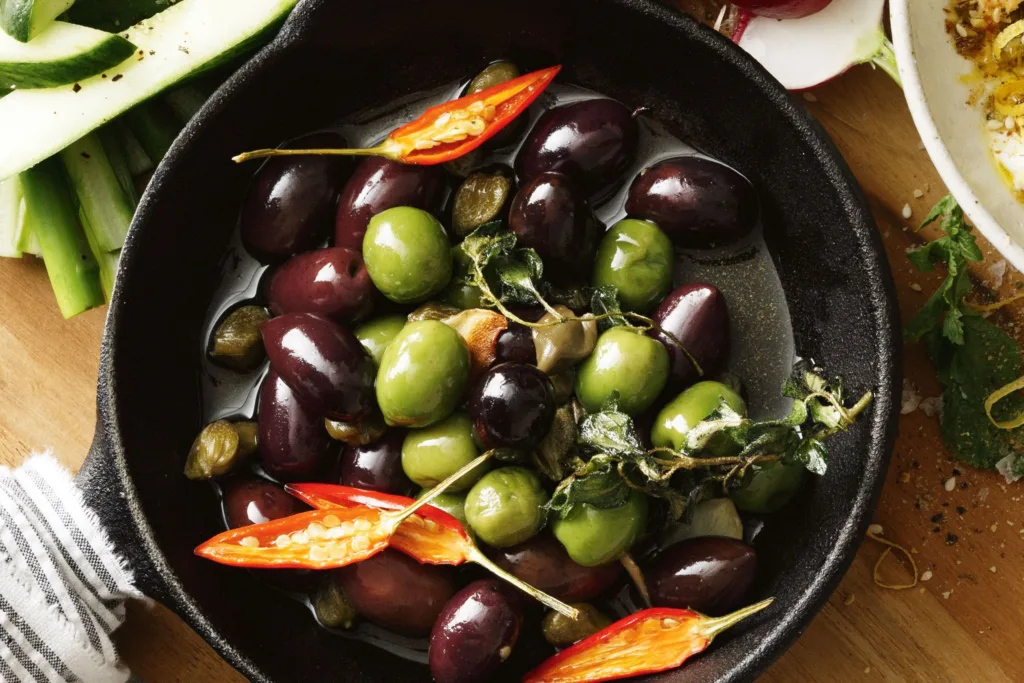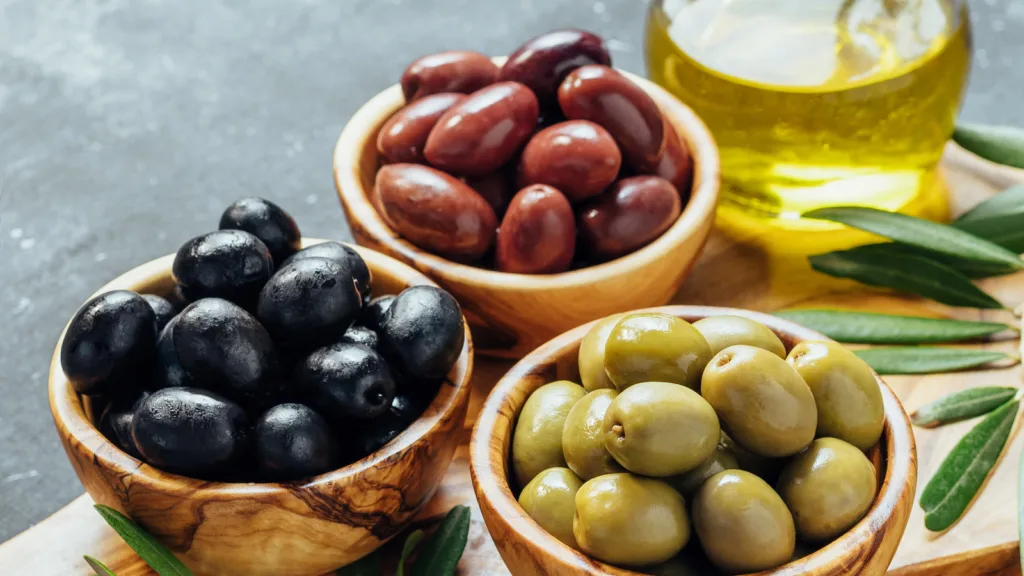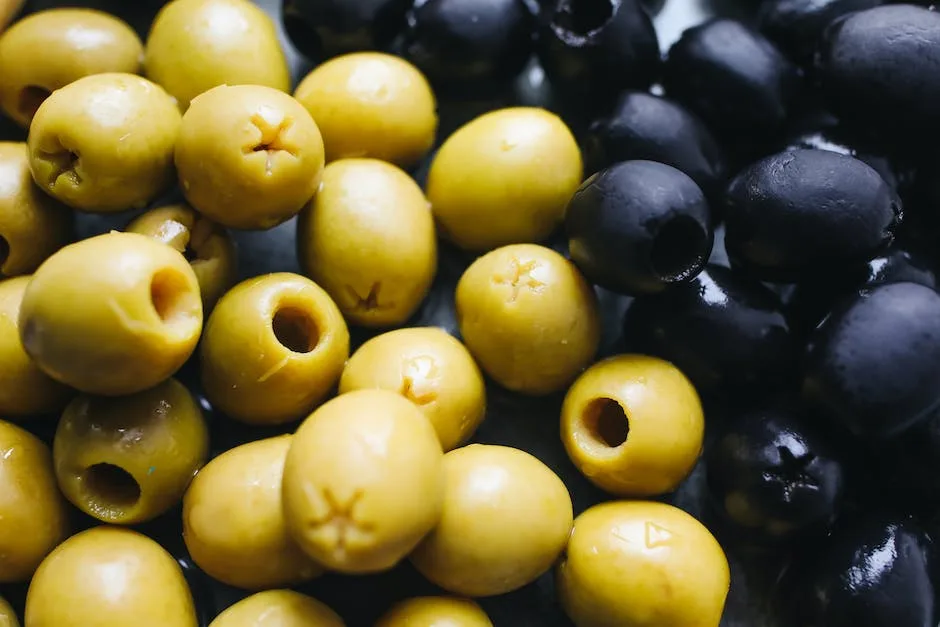The Mediterranean diet has become widely renowned as one of the healthiest and most sustainable ways of eating. With its emphasis on fresh, minimally processed foods like fruits, vegetables, whole grains, beans, nuts, seeds, and olive oil, this traditional diet of the Mediterranean region offers a multitude of benefits for overall wellness. In addition to promoting heart health and longevity, the Mediterranean diet has also been linked to easier weight management and loss.
A star player in this diet is the olive. As a key component of the cuisine of lands bordering the Mediterranean Sea, olives offer their own unique health perks. These flavorful fruits are loaded with healthy fats, antioxidants, vitamins, minerals, and satiating fiber. Together with other pillars of the diet like produce and lean proteins, olives may make an impact on the scale.
Let’s take a closer look at how the Mediterranean diet and its darling olive can spell success for weight loss goals. Here’s what the science says about how this power duo can slim your waistline and boost well-being.

The Mediterranean Diet Unveiled
At its core, the Mediterranean or Med diet emphasizes natural, minimally processed foods over convenience and packaged items. Some principles that define this regional way of eating include:
- Abundance of plant-based foods like fruits, veggies, beans, cereals, nuts, seeds, and olives
- Use of olive oil as the main fat source
- Moderate amounts of fish, poultry, eggs, yogurt, and cheese
- Limited red meat
- Low intake of processed foods, sugar, and refined grains
- Enjoyment of meals with family and friends
- Regular physical activity
- Wine in moderation with meals
With its focus on whole, fresh foods straight from nature, the Mediterranean diet intrinsically limits empty sources of calories. Meals and snacks center around satisfying, nutrient-dense picks that nourish the body.
Research suggests that closely following the Mediterranean diet can impart some significant health advantages. Studies link this eating approach to:
- Decreased risk of chronic illnesses like heart disease, diabetes, cancer
- Longer lifespan
- Reduced inflammation
- Improved weight loss and management
Several aspects of the Mediterranean diet may promote weight control. Its emphasis on plant foods delivers slimming fiber, vitamins, minerals, and antioxidants. Protein sources like seafood, poultry, eggs, yogurt, beans, and nuts are lean yet satisfying. Whole grains provide filling fiber without spiking blood sugar levels. And healthy fats like olive oil and olives curb appetite and balance blood sugar. Altogether, these nourishing staples make it easier to manage hunger and lose excess pounds.

Olives and Their Nutritional Power
A signature of the Mediterranean diet is the humble olive. This small, oval fruit is essential to the regional cuisines of countries like Greece, Italy, Spain, and Morocco. Olives grow abundantly across the Mediterranean on evergreen trees, and are consumed whole, chopped, or mashed into oil.
Over hundreds of olive varieties exist, ranging from green and black to purple, brown, and yellow. Popular kinds include:
- Kalamata: Almond-shaped purple olives with a robust, earthy flavor
- Manzanilla: Bright green, crisp, juicy olives with a sharp, tangy taste
- Picholine: Elongated green olives with a delicate, herbal flavor
- Ligurian: Small black olives with a rich, meaty taste
While delicious on their own, olives offer concentrated nutrition in a petite package. Just a 3.5 ounce (100 gram) serving provides:
- Healthy unsaturated fats like oleic acid – 55% of the Daily Value
- Fiber – 20% DV
- Iron – 20% DV
- Copper – 15% DV
- Vitamin E – 13% DV
- Calcium – 12% DV
Additionally, olives supply beneficial plant compounds like phytosterols, polyphenols, flavonoids, and anthocyanins. These antioxidants have anti-inflammatory and anti-aging effects within the body.
The monounsaturated and polyunsaturated fatty acids in olives primarily consist of oleic acid. This type of fat lowers LDL or “bad” cholesterol while maintaining levels of HDL or “good” cholesterol. The end result is better heart health and protection against cardiovascular disease.
Olives are also loaded with satiating fiber, which slows digestion to prevent blood sugar spikes. This assists in weight management by controlling hunger and cravings.
Furthermore, olives contain notable amounts of vitamin E. This fat-soluble nutrient has antioxidant properties that may enhance weight loss. Vitamin E also helps balance cholesterol levels already within healthy range.
Other vitamins and antioxidants in olives like polyphenols work to reduce oxidative stress and inflammation. Chronic inflammation has links to obesity, metabolic syndrome, and adipose tissue dysfunction. So olives’ anti-inflammatory capabilities may translate to easier weight control.
Overall, the unique supply of oleic acid, fiber, vitamin E, and antioxidants in olives make them a smart choice for managing hunger while optimizing health. Adding olives to meals like salads, pastas, pizzas, and more can definitely pay off on the scale.

Incorporating Olives into Your Diet
Implementing olives into your daily Mediterranean diet is simple with a little creativity. Here are some tips for livening up meals with appetizing olives:
- Toss whole or sliced olives into salads, grain bowls, pastas, pizzas, tacos
- Skewer olives with veggies or cheese for easy appetizers
- Blend olives into hummus, tapenades, pestos, and dressings
- Top proteins like chicken, fish, and steak with an olive relish
- Mix olives into omelets, frittatas, and other egg dishes
- Garnish soups, stews, and chilis with a sprinkle of olives
- Create olive oils and tapenades for dipping crusty bread
For a delicious fusion of olives and Mediterranean flavors, try these slimming recipes:
Mediterranean Olive Salad
Ingredients:
- 1 cup pitted Kalamata olives, sliced
- 1 cup cherry tomatoes, halved
- 1⁄2 English cucumber, diced
- 1⁄4 red onion, thinly sliced
- 3 tbsp fresh oregano, chopped
- 3 tbsp olive oil
- 2 tbsp fresh lemon juice
- 1⁄4 cup crumbled feta (optional)
Instructions:
Toss all ingredients except feta cheese in a bowl. Chill for 30 minutes and top with feta before serving.
Olive-Topped Grilled Chicken
Ingredients:
- 4 chicken breasts
- 2 tbsp olive oil, divided
- 1 lemon, juiced
- 2 garlic cloves, minced
- 1⁄4 cup pitted Kalamata olives, chopped
- 1 tbsp fresh rosemary, chopped
Instructions:
- Pound chicken to an even thickness and coat with 1 tbsp olive oil, lemon juice, and garlic. Marinate 30 mins.
- Grill chicken 6-8 minutes per side until cooked through.
- In a pan, sauté olives and rosemary in 1 tbsp olive oil. Top chicken with olive mix before serving.
Olive and Vegetable Quinoa Bowl
Ingredients:
- 1 cup quinoa, cooked
- 1 cup chickpeas, drained and rinsed
- 1 cup cherry tomatoes, halved
- 1⁄2 cucumber, diced
- 1⁄4 cup pitted Kalamata olives, sliced
- 1 tbsp olive oil
- 1 lemon, juiced
- 1⁄4 cup crumbled feta cheese
Instructions:
Toss all ingredients except feta cheese in a bowl. Top with feta before serving.
With some creativity, olives can add delicious flavor and slimming benefits to all kinds of Mediterranean diet dishes. Allow their powerful nutrition to guide you toward effective, sustainable weight loss success.

Conclusion
Olives have been a flavorful part of Mediterranean cuisine for centuries. Now, modern science is uncovering their unique health advantages. With healthy fats, satiating fiber, antioxidant vitamins, and more, olives offer the perfect complement to the fresh, wholesome foods of the Mediterranean diet.
Together, olives and the Mediterranean eating approach may help unlock the door to weight loss. By controlling hunger, reducing inflammation, and optimizing overall health, this olive-accented way of eating provides a balanced path to shedding excess pounds. With some practical tips, anyone can incorporate olives into their meals for enhanced weight management and well-being.
Embracing olives and the Mediterranean diet for the long haul can lead to transformative yet realistic weight loss success. More importantly, it allows you to rediscover the joy of fresh, wholesome foods that nourish body and soul.
Thank you for reading! Don’t forget to subscribe to our newsletter below for more tips on embracing the Mediterranean lifestyle for health and weight loss. Check out our related posts on other amazing foods, plus nutrition, fitness, and wellness. Together we can cultivate sustainable, holistic well-being.
Thank you for reading this post, don't forget to subscribe to our free newsletter
!

